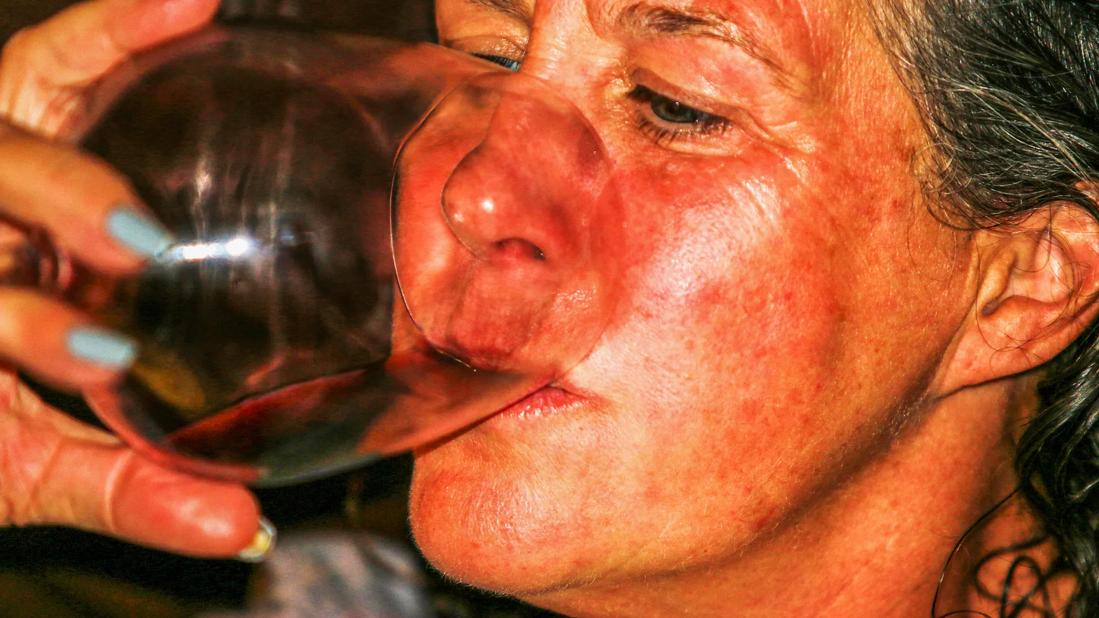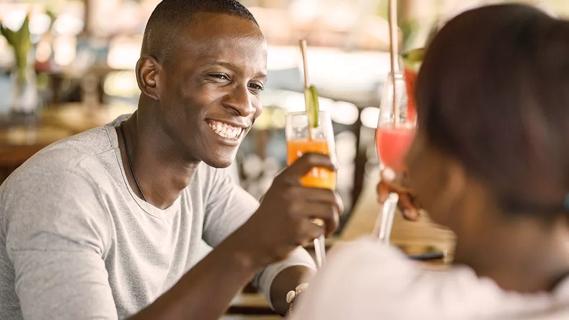An enzyme deficiency or rosacea are potential causes of alcohol flush

Maybe it comes on in those first few sips or after a couple cocktails, but whenever you drink, your face and upper chest get beet red and warm to the touch. Is facial flushing something you should be concerned about?
Advertisement
Cleveland Clinic is a non-profit academic medical center. Advertising on our site helps support our mission. We do not endorse non-Cleveland Clinic products or services. Policy
Dermatologist Melissa Piliang, MD, explains the science behind alcohol flush reactions and how to prevent them from happening.
An alcohol flush reaction is common if you have an alcohol intolerance and can’t fully digest the alcohol you drink. When an alcohol flush happens, your face, neck and upper chest become warm and pink or red. You might also have other symptoms like nausea or vomiting, depending on what’s causing your intolerance.
This condition is often referred to as the “Asian flush” or “Asian glow” because 35% to 45% of East Asians have a genetic intolerance to alcohol that causes this reaction.
An enzyme deficiency and rosacea are two possible causes for an alcohol flush reaction. Both are tied to your genetic background and family history, says Dr. Piliang.
Alcohol in any form — including wine, beer and hard liquor — contains ethanol. When you drink alcohol, your liver converts ethanol into acetaldehyde, which is classified as a cancer-causing substance that can cause cell damage. So, your body needs a specific enzyme called alcohol dehydrogenase 2 (ALDH2) to convert acetaldehyde to a nontoxic substance called acetic acid (vinegar).
“Alcohol is toxic to cells, and when it gets into the cells of your blood vessels, it makes them dilate,” explains Dr. Piliang. “This reddens your skin and can make you feel warm.”
Advertisement
But without enough ALDH2, you can end up having too much acetaldehyde in your body. This makes alcohol reach toxic levels much earlier in your cells, resulting in the alcohol flush reaction.
For anyone with an ALDH2 deficiency, facial flushing can be experienced with nausea or vomiting because of your body’s inability to fully digest the alcohol you’re consuming.
But if you don’t have an ALDH2 deficiency and still get flushed whenever you drink alcohol, it may be caused by rosacea.
“Rosacea is a very common skin condition for people who have Northern European backgrounds,” says Dr. Piliang. “It’s marked by vasomotor instability or hyperactivity. That means lots of things can dilate your blood vessels: alcohol, chocolate, hot beverages and spicy foods — basically, all the good things in life.”
If you have an ALDH2 deficiency, the only thing that can help prevent an alcohol flush reaction is to limit or avoid alcohol entirely. If you still want to drink alcohol and facial flushing symptoms make you feel self-conscious, certain treatments can help.
Topical medicines like brimonidine (Mirvaso®) can block blood vessels in your skin from dilating. “These medications aren’t typically recommended because facial flushing is your body’s natural reaction to toxic levels of acetaldehyde,” clarifies Dr. Piliang. “When this happens, it’s a sign you should stop drinking or drink water instead.”
A series of laser treatments can also shrink the superficial blood vessels in your skin. “You usually need three to 10 treatments to get the full effect, but it can last for years, and prevent broken blood vessels in the later stages of rosacea,” she adds.
And anyone who has an ALDH2 deficiency is still at higher risk for:
If you have rosacea, your alcohol flush reaction may be triggered by different kinds of alcohol. So, you might be able to prevent it by limiting the kinds of alcohol you consume.
“Facial flushing from alcohol is really patient-specific for people who have rosacea,” says Dr. Piliang. “Some people with rosacea flush more with red wine. Others flush more with hard liquor.”
If you have rosacea, keep track of what happens when you drink and take note of your triggers.
Overall, if facial flushing is an issue for you at all, avoiding alcohol in all forms might be the next best solution.
“If flushing bothers you, and you know alcohol is a trigger, the easiest and most cost-effective solution is to avoid it,” says Dr. Piliang.
Advertisement

Sign up for our Health Essentials emails for expert guidance on nutrition, fitness, sleep, skin care and more.
Learn more about our editorial process.
Advertisement

Your tolerance decreases with age, thanks to body changes, health conditions and medications you may take

‘Blackout rage gallons’ can lead to dangerous levels of alcohol consumption

ACV may help lower blood sugar and calm acid reflux, but don’t believe all the hype

Yes, grabbing a few beers or a couple of glasses of wine or cocktails with friends can increase your heart rate — dangerously in some cases

Alcohol (in any amount) is a well-known cause of cancer

Forget the myth and answer nature’s call when your bladder feels full

Alcohol provides empty calories, heightens cravings and may slow down your metabolism

Drinking during the day can result in drinking more than usual and worsen your sleep cycle

Even small moments of time outdoors can help reduce stress, boost mood and restore a sense of calm

A correct prescription helps your eyes see clearly — but as natural changes occur, you may need stronger or different eyeglasses

Both are medical emergencies, but they are very distinct events with different causes